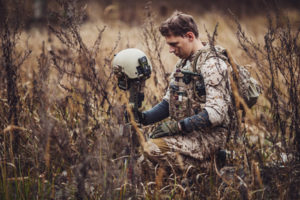 There’s No PTSD and Depression Treatment Like This Treatment: IV Ketamine
There’s No PTSD and Depression Treatment Like This Treatment: IV Ketamine
Do sudden noises make you jump and feel like your heart just stopped? If someone pats you on the back while saying hello, does it take everything inside you to keep from beating them to the ground? Do you find yourself on edge, feeling more and more tense and vigilant as the sun goes down…?
If this sounds familiar, you may be suffering from Post Traumatic Stress Disorder, or PTSD.
PTSD is cruel, and happens as a result of severe traumatic experiences that live on in your head even after the event is over.
Military men and women who’ve seen active combat sometimes suffer from PTSD. As time passes, the symptoms are more likely to become worse than better.
PTSD Caused By More Than Combat
But, it’s not only the combat zone that causes it. It can be caused by a dangerous event, like a car crash, or domestic violence, or a major natural event.
Whatever the original cause, PTSD has a way of creating a life of its own. You tend to reach a point where you separate the past from the present based on date of that event. Life before the trauma, and life after the trauma.
That particular battle where you were ambushed, and your friends were maimed or killed.
That specific day when the beating was so vicious, his rage so terrifying, that you dream about it every night and wake up in a cold sweat.
That storm of storms that ripped your house apart while you trembled in the bathtub with your children…
As painful and terrifying as these memories are, many people just don’t know what to do but try to white-knuckle the nights of terror, then pull themselves together and muscle through the days.
The trouble is, “just muscle-ing through” doesn’t improve the symptoms. At least most of the time.
Instinctive Responses to PTSD Symptoms Don’t Help You Get Better
People tend to respond to the horrific symptoms of PTSD in either of two ways. Either they avoid thinking about the event, the traumatic memories, and anything associated with it, or they become extremely alert and on edge.
If you’re trying to avoid thinking about the painful and terrifying memory, it might look something like this:
- You’d probably avoid going places, or seeing people that reminded you of what happened.
- You’d also likely avoid discussing it with anyone, or talking about anything that might stir up the memory
- As a result, you’d likely not want to be around other people, since you can’t know when someone might talk about something that conjures that pain
- And you’d probably feel safer just not going out, and not making plans to do much of anything in the future, because you just feel safer at home.
 On the other hand, if you’re one to respond to this trauma with extreme alertness, you might have these reactions:
On the other hand, if you’re one to respond to this trauma with extreme alertness, you might have these reactions:
- You can’t go to sleep or even if you can, it doesn’t last. Sleep becomes almost impossible to maintain.
- Emotional outbursts are frequent, out of proportion to the circumstances, and leave others shaken and you embarrassed.
- Concentration is tough. Focus almost impossible.
- Irrational reactions to common everyday things like a barking dog, a ringing doorbell or honking car, or even someone patting you on the back…
These are part of your daily life.
PTSD and Depression Treatment
As widespread as PTSD is, you’d think treatment would have been figured out long ago. But that’s not the case. Until now, PTSD and depression treatment have been limited to certain SRI’s that have been prescribed like Zoloft and Paxil, with limited results. These are the only two medications approved by the FDA for PTSD. But they aren’t always effective.
PTSD has a long-standing reputation for being really hard to treat. And that’s been especially true among those who are serving and have served in active duty military settings. In real English: Combat.
Combat PTSD Conference
On October 18 of this year, Dr. John Krystal, Chair of the Psychiatry Department at Yale University, spoke to a group of researchers at the  San Antonio Combat PTSD Conference.
San Antonio Combat PTSD Conference.
Dr. Krystal studies ketamine, and how it affects the brain. As he spoke, he expressed that ketamine works rapidly relieving symptoms of depression in trials, and some patients showed a reversal of symptoms after just one intravenous dose.
With excitement in his voice, he spoke about the astonishment of working with people who suffer from treatment-resistant depression, and seeing their response to a single dose of ketamine. He said, “it’s the most remarkable thing I’ve seen in my career…!”
When he spoke about ketamine’s impact on men and women with PTSD, he noted that while not all achieve complete remission from symptoms, the average achieve 50-75% reduction in symptoms. Since traditional antidepressants only provide about 10% reduction in symptoms, this is clearly a remarkable relief for these patients.
And, he added, ketamine’s dramatic improvement over symptoms isn’t the only reason for its promise for PTSD patients.
Its rapid onset makes it the one medication that can reverse the suicidal thinking fast in these people.
Ketamine Does More Than Anesthetize Symptoms – It Restores Brain Structures
As we’ve talked about here before, PTSD and depression can cause the synaptic structures in the brain to break down. Dr. Krystal refers to this as “loss of synaptic connectivity.” When these breakdown, certain mental functions are impaired. Things like memory, planning ability, and emotional control are greatly affected – as seen in patients with PTSD.
emotional control are greatly affected – as seen in patients with PTSD.
The beauty of ketamine is its action in restoring those structures, replenishing them, and doing it very fast.
A 4 week study is underway on ketamine and its use in PTSD. The study takes place in San Antonio, TX and West Haven, CT, involving nearly 200 military personnel. The aim of the study is to test various ways of dosing ketamine, and its effectiveness.
We welcome studies conducted to learn more about ketamine. My professional reaction to the impact of this remarkable drug on those who suffer from PTSD, depression, and other psychiatric mood disorders is similar to Dr. Krystal’s: “It’s one of the most remarkable things I’ve seen in my career.”
Ketamine: Most Remarkable PTSD and Depression Treatment Out There
At Innovative Psychiatry, we’ve consistently seen 80% of cases of PTSD, depression, anxiety, and other mood disorders achieve a strong response to ketamine treatment. We offer a variety of innovative treatments, but ketamine is hands-down the most extraordinary PTSD and depression treatment we offer.
If you suffer from PTSD, you know that this condition can wreck your life and relationships. You know the helplessness and shame you feel after flashbacks, irritable over-reactions, and night terrors.
I’ve heard PTSD patients who endured traumatic combat experiences say they refuse to see anyone who hasn’t been in the military. And I  understand why.
understand why.
But, this medication is not like the others. Patients with PTSD emerge from ketamine treatment feeling as if a weight has been lifted off, feeling more at ease, less vigilant, and more able to process their trauma. They feel more resilient, more able to contribute to healthy relationships. They feel safer in their own skin.
After treatment, we encourage you to work with your own psychiatrist or therapist to continue to rebuild your life. You’ll most likely find your ketamine treatment has dramatically transformed your ability to process the trauma you’ve experienced, your outlook, and your desire to move forward in your life.
To the restoration of your best self,
Lori Calabrese, M.D.
